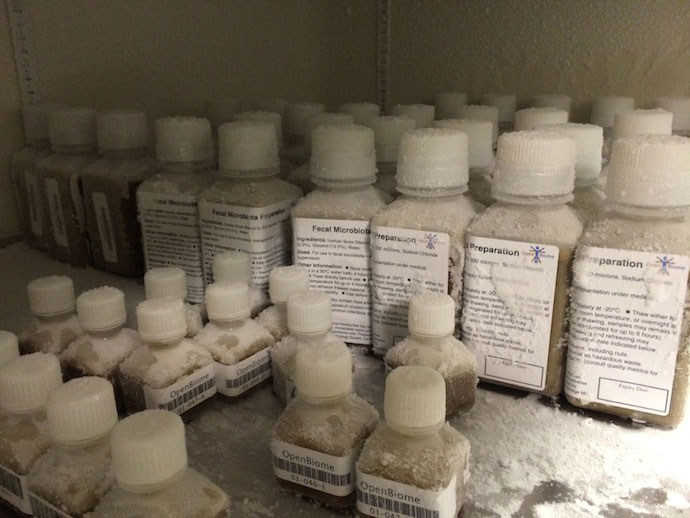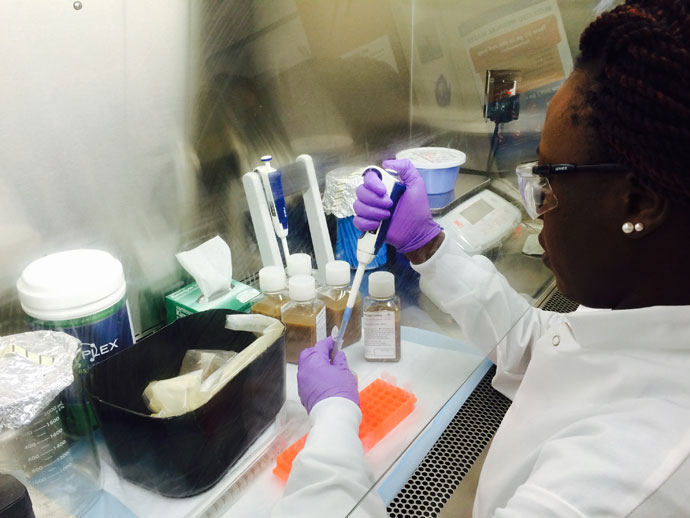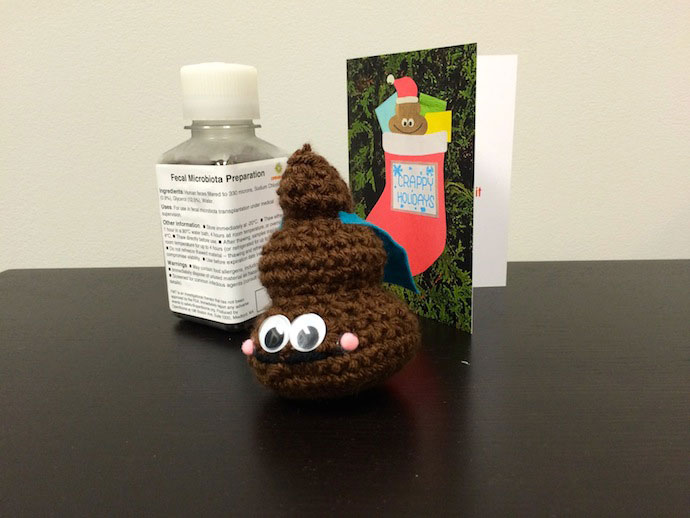Stool Bank Wants You To Give A Sh!t This Holiday Season
In the spirit of the holidays, the nonprofit stool bank OpenBiome recently launched the Give a Sh!t Campaign in the hopes of raising money so the organization can better serve patients who need fecal transplants.
The Medford, Mass.-based organization screens poo donors, collects and processes samples and provides the necessary stool to independent doctors and hospitals when a patient is suffering from the dangerous C. difficile infection, which is caused by antibiotics. However, OpenBiome wants to expand beyond the Boston area. Even though the poop bank has shipped over 1,500 treatments to 150 hospitals and clinics in 36 states, many patients still have to fly thousands of miles to reach a fecal transplant provider, according to its Indiegogo page.

OpenBiome
The Give a Sh!t Campaign, which runs through Jan. 23, has two goals. The first is to partner with a doctor in each of 601 cities across the country, allowing 90 percent of the population to be within a two-hour drive of treatment. The second is to transition from the current method of treatment, which uses implanted tubes, to a new, less invasive “poop pill.”
Essentially, we are encapsulating a stool preparation similar to the material used in other forms of fecal transplants (colonoscopy, enema, NG tube) to make treating people by FMT [fecal microbiota transplant] easier,” explained Carolyn Edelstein, director of Global Partnerships at OpenBiome.
Edelstein told Wall Street Insanity that the poop bank is still testing variations of the formulation and preparation for the pill; however, when they find the right combination, it will make patients’ lives a lot easier.
In addition to being less invasive, the procedure also becomes more accessible this way — instead of needing to find a gastroenterologist or infectious disease specialist who can perform a colonoscopy, patients will be able to get treated by a wider body of clinicians,” said Edelstein. “Access to FMT remains a major hurdle for patients with recurrent C. difficile infections, and the easier we make it for doctors to offer the therapy, the easier we make it for patients to get the help they need.”
Coming up with the perfect poo pill takes more equipment and more staff, however. Edelstein told Wall Street Insanity that with the proceeds from the fundraiser, OpenBiome hopes to purchase a biosafety cabinet that can be dedicated to preparing the pills. Currently, the stool bank only has one such cabinet, and it’s mostly used for preparing FMT material, so pills can’t be produced very quickly. The lab also wants to get a freezer so it can store the pills on site, in addition to other lab equipment that will allow OpenBiome to produce more pills faster.
In the medium term, to really meet the demand we’ve seen, we need to significantly expand our laboratory and bring on new technicians,” said Edelstein.
The Give a Sh!t Campaign entices donors to fund OpenBiome’s efforts by offering different perks depending on how much you donate. For $5, you get to name a poop, and will receive a photo of your adopted poo in its collection hat. For $10, you can choose to receive the Guess Poo! game, which features pictures of “exotic poop and things that look suspiciously like poop but aren’t.” OpenBiome calls it “an excellent category addition to any trivia night.”
Bigger spenders can select from among choices like the $5,000 “Biobank Your Own Poop” option; in addition to a tour of the lab and dinner with the OpenBiome team, donors at this level will get to have their stool prepared, processed and cryogenically stored for up to two years in case they need a future transplant.
Edelstein said she hopes donors won’t feel awkward about meeting the people who process their stool.

OpenBiome
The experience would likely feel very much like going to the doctor,” she told Wall Street Insanity. “Our technicians see lots of poop every day (in fact, they also see the people who donate all that poop every day) and I expect that biobanking would feel professional and fairly clinical. If they did want to delve into what it’s like to work with poop all day, our technicians could certainly tell them some fun trivia!”
Donors at the $5,000 and $1,000 levels can also learn about what goes on inside their intestines. Using high-throughput 16s RNA sequencing, the stool banks’ bioinformaticians will analyze and characterize each donor’s microbiome. To discuss the results of their analysis, says Edelstein, donors will speak with OpenBiome cofounder Mark Smith, who is a postdoctoral fellow in the Alm Lab at MIT, where he studies “computational microbiology focusing on the human gut.”
Mark will discuss what we know about the complex community of bacteria that resides in their gut,” explained Edelstein. “This ecosystem contains trillions of bacteria that collectively enable efficient metabolism and protect against infections. He will illustrate the composition of each donor’s microbiome and discuss how their community compares to healthy reference samples.”
Intestines, bowel movements and fecal matter may not be very widely discussed topics, but based on the recent increase in the use of probiotics, more and more Americans are taking an interest in their gut bacteria — perhaps making them a little more open to the topic of poo.
You know, it’s funny,” said Edelstein when asked if OpenBiome has had difficulty dealing with people’s preconceived notions about poop. “Personally at least, I have yet to talk to someone about what I do and get a completely disgusted reaction. I think the idea that our stool has curative properties for a really terrible illness fascinates people.”
She added that this may be because our understanding of bacteria has been changing.
Instead of thinking of all bacteria as bad, recent research has helped us appreciate that the bacteria that live inside of us have an integral role to play in how our body works (in fact, for every one human cell in our body, there are 10 bacterial cells!). Probiotics introduced the idea that you might want to encourage the presence of some of that helpful bacteria. People maybe think of a fecal transplant as an uber-probiotic.”
So if you’re in the mood to embrace the world of fecal matter and friendly bacteria, OpenBiome would love it if you donated some funds — or even a sample of your stool.










































